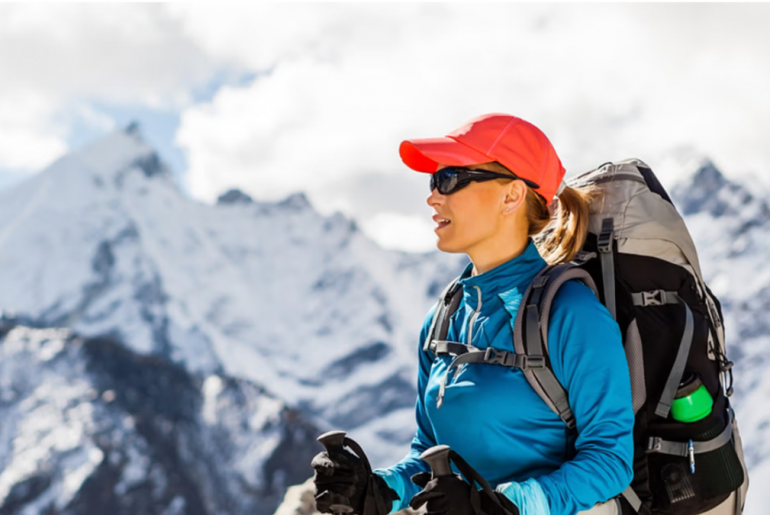The best thing about the outdoors is that it can be enjoyed in many forms. If you are someone that enjoys hiking in the mountains, but is looking for something that is more adrenaline pumping, then mountaineering may be for you.
Mountaineering is a much higher-involvement activity that requires mental tenacity and often, special tools. If you want to follow in the footsteps of other successful mountaineers and test your physical and mental strength, it’s vital to be prepared. Here are some mountaineering tips for beginners that will ensure your early experiences are enjoyable and safe.
1. Prepare Yourself With Tools and Training
Much like training for a marathon, you must prepare yourself for the challenging climb up the mountain. Do this by equipping yourself with the right tools and training.
It may sound simple, but it is important to put thought into every piece of gear you will carry. Headlamps are essential to any outdoor adventure and it is no different for mountaineering. However, when you get a headlamp for mountaineering, you should make sure it’s lightweight, has a long runtime, and is preferably rechargeable. This will ensure you don’t carry extra weight in batteries. While most outdoor headlamps offer impact resistance, it’s best to not rely on only one source of light when you are outdoors. So consider looking at some flashlights that will be a good backup option should your primary light suffer any damage.
In addition, consider enrolling in a mountaineering school, where you can not only learn safe and effective climbing techniques, but also train on using different mountaineering equipment.
As someone who hikes, you understand the challenges posed by changing elevations and grueling trails. While your cardiovascular health is definitely important, don’t ignore flexibility and muscle strength development. Joining a yoga or pilates class will enable you to build both. This will help ensure that a small slip doesn’t result in a bigger injury on the trail.
2. Interact With Others on Online Forums
Outdoors lovers are great about sharing information and tips on mountaineering. If you are considering beginning your mountaineering journey, it’s a good idea to spend time frequenting platforms such as Reddit or even specialized Facebook groups.
These are great places to get tips on things you should consider on your first mountaineering adventure, receive updated route status, or get recommendations on different kinds of specialized gear. Mountaineering veterans are also great at sharing their learning, so don’t hesitate to ask them questions.
Information is one of the most important things to have when you are out in nature. Conditions change fast and unexpected challenges can stop you in your trail, so you may want to make it a habit to gather (and share) as much information as you can about the routes you plan to undertake.
3. Cut Out Unnecessary Gear
As a hiker, you know that preparation is key, but overprepration can be a bummer. How many times have you seen people lugging gigantic backpacks, huffing and puffing up a mountain while hiking? Simply put, this isn’t an option when you are mountaineering.
The paths you traverse will be more challenging and will often require you to be quick on your feet. Don’t be weighed down by a lot of extra clothing and gear in your pack. Trust us, you do not need four pairs of socks for a two-day trip.
If possible, invest in lighter, warmer clothing such as base layers made of Merino wool. This will keep you warm without adding too much extra weight to your pack.
4. Invest in a Quality Mountaineering Backpack
While shopping for mountaineering clothing, check out your options for mountaineering backpacks. If you plan to join a mountain expedition, consider investing in a backpack with a removable frame. That way, you can use the frame to haul your gear into the camp before removing the frame for the rest of the journey.
Pay close attention to the product name while shopping for a backpack. You want to purchase a mountaineering pack rather than a backpacking pack. One handy feature is a built-in holder for flashlights, ice axes, and climbing helmets. Try the backpack on before buying it to make sure it fits comfortably.
5. Pack the Right Food/Fuel
Be strategic about the food you pack to fuel your high-altitude adventures. For the ascent, bring energy-boosting foods like oatmeal, breakfast bars, hard cheese, granola bars, and bagels. Once you get to the top, you’ll likely need to replenish the energy you spent on the climb. Snack on nutritious, high-carb foods like dried fruit, mixed nuts, and cereal bars.
Mountaineering’s sure to become your new favorite outdoor activity, and you’ll enjoy your time more when you know what to expect. As you pack and prepare, keep these essentials in mind.

